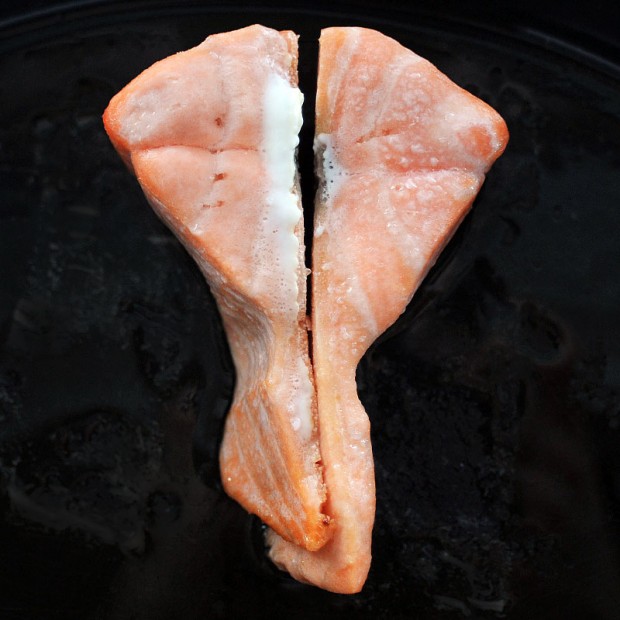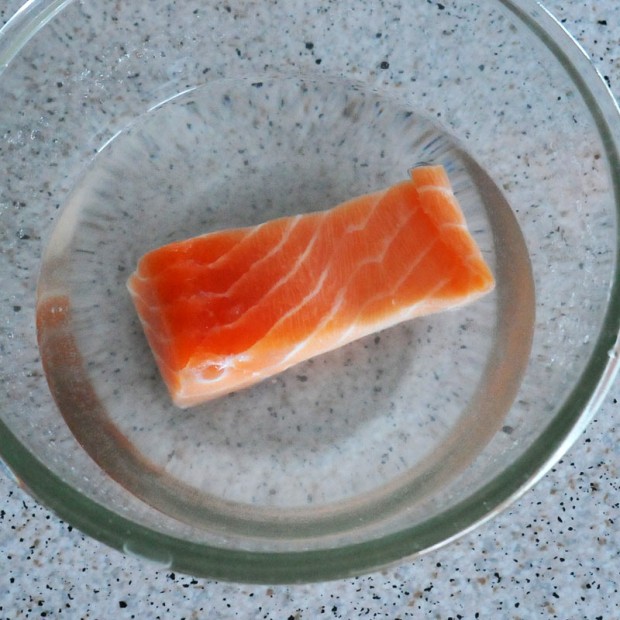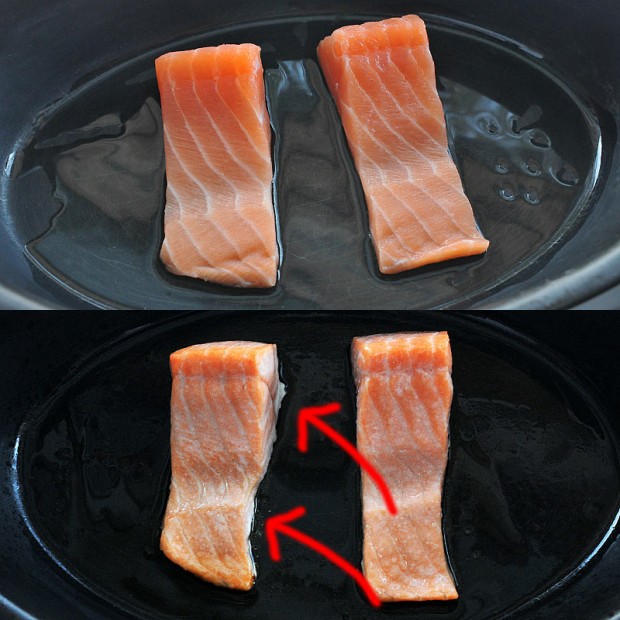
Avoid the white exudate (left) by brining salmon (right) prior to cooking
Salmon is a wonderful fish that can be prepared at nearly any temperature between raw (as in sushi) and fully cooked. In between these extremes lies a range of temperatures that with the advent of sous vide have become accessible for more and more (try for instance salmon confit: 18 min @ 42°C). Beyond temperature salmon can be combined with salt, sugar, acids, liquorice or even smoke. And the more adventurous even leave it to ferment for a couple of days to yield a gravlax (which used to be fermented, but today normally is only cured) or – for the strong hearted – rakfisk (which is still produced by fermentation). But exotic preparations aside. A problem encountered when heating salmon is the liquid that oozes out as the muscle is heated, and solidifies once it hits a hot surface. I say problem, but should stress that it is perfectly fine to eat the white exudate – it looks like egg white and is composed mainly of protein. But since the exudate is not particularly beautiful, for a nice plated dish one would preferably choose a way of preparing salmon that eliminates the formation of exudate.

Immersing salmon for 10 min in 10% solution of salt in water prior to cooking does wonders
The solution to this problem is quite simple: Brine the salmon in a 10% brine 10 min before cooking it. The brine is made by dissolving 50 g salt in 450 g water. A possible explanation I’ve found for why this works is that the protein myosin, which is present in muscles and the culprit of the white exudate, is partly dissolved in the brine. Upon heating a gel is formed, effectively trapping any further myosin inside the meat so it cannot ooze out, even when the meat is heated. I learnt this from sous vide pioneer Bruno Goussalt who told he had learnt it from a Norwegian chef when he lived and worked for 3 years in Stavanger. Bruno could not remember the name of the Norwegian chef any more, but perhaps some of my readers can help me? Who was the first to discover this effect of brining on salmon?

Salmon (left unbrinded, right brined) before and after beeing baked. Red arrows show where exudate is formed and gels as it hits the hot surface of the baking dish

Hey Martin, nice to see you back over the festive season…
The brining does indeed seem to work. The white stuff (I’ve read somewhere it’s mainly albumen) only seems to come out at low temperatures: from sous-vide to slow stove-top poaching in oil for example.
On the other hand high heat (pan frying, contact grilling) doesn’t seem to generate the exudate. Perhaps the protein is transformed ‘maillard-like’ on contact?
Any thoughts?
The salmon was baked at 200 °C, so it’s a problem even then. But I can imagine that slower heating will increase the problem. Could be though that a very high temperature in fact does congeal the albumen and thereby “seal” the surface and prevent the exudate from forming. In that case we have found an examples where “searing is sealing” (as opposed to Maillard where “searing is not sealing”…).
Well spotted re Maillard!
A quick look around the web shows:
a) A lot of ignorance
b) That albumin doesn’t start oozing out until the salmon hits 43C
c) That grilling on one side a thick slice will get the fish to generate the white stuff on the other side (I guess as the core temperature gets closer to 43C)
d) That deep frying briefly may get you the best of both worlds: crispy, clean outside, yet a very moist inside
Here’s an interesting discussion:
http://forum.chefsteps.com/discussion/49/salmon-and-albumin
Do you guys ever cook or just talk about it ? Yes it comes out with pan searing and other forms of high heat cooking. It’s also been reported on with the brine fix (5% for 10 minutes works fine too, again, try it instead of talking about it) repeatedly. That’s another thing I’ve noticds with the endless food blogging – the same things get discussed over and over and over and over.
I certainly cook a lot, but somehow there is not enough time to test everything 🙂
This seems to be a complex solution to a silly problem. I grill salmon 3-5 times a week, no such thing on the grill. My pet peeve is grocery stores that skin salmon. There is a layer of fat on the skin that favors the meat you lose and the skin serves a great purpose on the grill. This is even truer on swordfish. I won’t even buy it if the skin is gone, too much flavor is lost. Also keeps the fish more moist.
My father, who worked in the seafood industry for decades always told me that the white stuff that oozes out is due to the salmon having been frozen somewhere in the logistics chain from ( now usually farm ) to fishmonger or supermarket. I buy my salmon at the fishmonger and usually cook it in a skillet, skin side on high heat for a short amount of time and then low temperature to let it cook very slowly. I never see the exudate except when I buy supermarket salmon.
In my experience this is not related to freezing. I’ve observed this also for fresh fish. But perhaps the problem is even more pronounced with salmon that has been frozen?
Hi, an interesting question
is this wild salmon or farmed salmon
If farmed salmon is it described on the
Packet as Organic , if so does it list
all the chemicals etc farmed Salmon are
fed, if the amount of chemicals and pesticides
we’re listed on the packaging say for example
Beef or poultry products that go into
Farmed Salmon these beef and poultry
Products would be banned in Europe
If not world wide….. another question why are
the Russians seriously thinking of banning
Farmed Salmon from Northern Europe
Dave Byrne Ireland
[…] “versiegeln”. Noch schneller geht das mit einer 10% Salzlösung in ca. 10 Minuten nach Martin Lersch. Streiten kann man sich, ob eine Buttersauce zu Lachs passt. Wer Buttersaucen liebt, dem ist halt […]
Most Swedish chefs brine their fish quickly for several reasons. Because it looks prettier but also because it firms upp slightly. Also the salt is more integrated, even though the salt ions only permeates a few millimeters it makes a big difference (esp for salt sensitive people like me that hate sensation of salt grains on the surface. I even brine fish before frying it for that reason.
One reason you do not see any exudate when cooking with high heat is because the water evaporates so quickly and the protein turns brown on the surface of the fish or forms brown pieces aka pan scrapings.